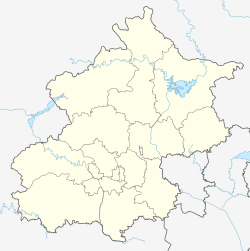Xingcheng station (Beijing Subway)
Xingcheng station (Chinese: 星城站; pinyin: Xīngchéng Zhàn) is a station on Yanfang Line of the Beijing Subway. It was opened on 30 December 2017.[1]
.jpg) | |||||||||||
| Location | Jingzhou Road (京周路) and Dadou Road (大窦路) Xingcheng Subdistrict, Fangshan District, Beijing China | ||||||||||
| Coordinates | 39°42′49″N 116°03′41″E | ||||||||||
| Operated by | Beijing Metro Operation Administration (BJMOA) Corp., Ltd. | ||||||||||
| Line(s) | Yanfang line | ||||||||||
| History | |||||||||||
| Opened | 30 December 2017 | ||||||||||
| Services | |||||||||||
| |||||||||||
| Location | |||||||||||
 Xingcheng Location in Beijing | |||||||||||
Station Layout
| 2F | Westbound | ← Yanfang line towards Yanshan (Dashihe East) |
| Eastbound | Yanfang line towards Yancun East (Yancun) → | |
| G | Concourse | Exits A-B, Faregates, Station Agent |
Exits
| Exit | Destination | |
|---|---|---|
| Jingzhou Rd., Dadou Rd., Xingcheng Beili | ||
| Jiande Middle St., Yanshan Xingcheng Primary School |
Gallery
.jpg) Platform
Platform
gollark: <@!341618941317349376>
gollark: https://esolangs.org/wiki/WHY#WHYJIT
gollark: WHYJIT is now production-unusable!
gollark: _continues WHYJIT development_
gollark: ```python#!/usr/bin/env python3import argparseimport subprocessparser = argparse.ArgumentParser(description="Compile a WHY program")parser.add_argument("input", help="File containing WHY source code")parser.add_argument("-o", "--output", help="Filename of the output executable to make", default="./a.why")parser.add_argument("-O", "--optimize", help="Optimization level", type=int, default="0")args = parser.parse_args()def build_output(code, mx): C_code = f"""#define QUITELONG long long intconst QUITELONG max = {mx};int main() {{ volatile QUITELONG i = 0; // disable some "optimizations" that RUIN OUR BEAUTIFUL CODE! while (i < max) {{ i++; }} {code}}} """ shell_script = f"""#!/bin/shTMP1=/tmp/ignore-meTMP2=/tmp/ignore-me-too cat << EOF > $TMP1{C_code}EOF gcc -x c -o $TMP2 $TMP1 chmod +x $TMP2 $TMP2 """ return shell_scriptinput = args.inputoutput = args.outputwith open(input, "r") as f: contents = f.read() looplen = max(1000, (2 ** -args.optimize) * 1000000000) code = build_output( contents, looplen ) with open(output, "w") as out: out.write(code)```
This article is issued from Wikipedia. The text is licensed under Creative Commons - Attribution - Sharealike. Additional terms may apply for the media files.